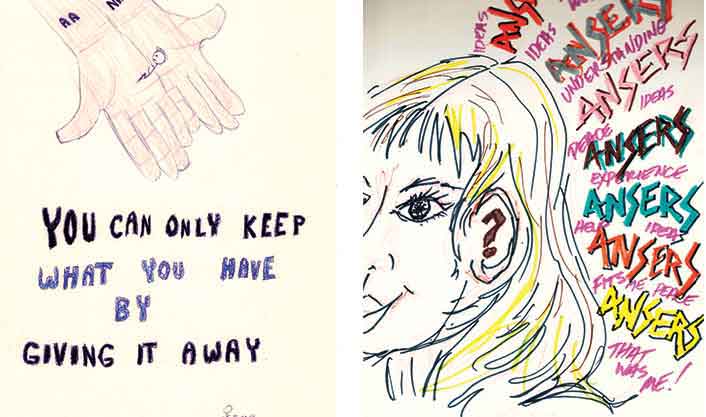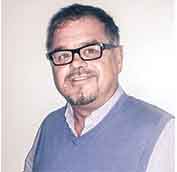Dream Journal
Note from Dr B.
Our theme this month is spirituality. Join us as we delve into the Second Tradition of AA, and gain insight from our featured guest writer, Drew Midgal, the Co-Founder and Executive Director of Bridges Sober Living.
I will be holding a Parents Academy lecture on March 19th from 7:00 to 9:00 pm at the Maine Township Town Hall in Park Ridge, Illinois. The Parents Academy is an informational presentation that instructs parents on how to guide their children through the difficult years of adolescence and how to identify risky behaviors. If you would like to attend or need any additional information, contact us at (504) 510-2331.
Monthly Tradition
#2: “For our group purpose there is but one ultimate authority – a loving God as He may express Himself in our group conscience. Our leaders are but trusted servants; they do not govern.”

Questioning authority is not a bad thing in itself, but like so many other instincts and dispositions in addiction, it is often taken to extremes outside the margins of healthy, realistic proportions. Addiction impairs an individual’s ability to trust appropriately.
Over the years, addictive behaviors laced with dishonesty, isolation, and secrecy can ingrain perceptions tinged with paranoid thinking and inclinations of feeling victimized by life. Fresh and raw in early sobriety, people with addiction are notoriously restless, irritable, and discontent without substances to alter their mood. Dr. William Silkworth observed these characteristics in, “The Doctor’s Opinion” a preface to the Big Book of Alcoholics Anonymous. Separated from the familiar method to immediately ease any discomfort, people with addictions can be extremely touchy, sensitive souls. Authority is resisted fiercely. As most people with chemical dependency have an inner sense that what they are doing in their addiction is not socially acceptable, authority in any form represents their drugs being taken away from them. An indelible fear and dislike of authority is not uncommon.
We see this on a daily basis with new clients in the treatment setting who may protest the simplest of guidelines and rules as mortally oppressive and personally offensive. After a week or so, the intensity of the ire usually withers. Yet this is a process, and the embers of distrust may need a much longer duration to fully fade. For example, someone several years into successful recovery may experience an unreasonably high spike in anxiety when passing a police car on the highway despite abiding by all laws. The residue of an aversion to authority figures may linger, but is likely to diminish over time.
When encountering a 12-step fellowship for the first time, a person with addiction on some level may yet be itching for a fight, skeptical and keen to spot reasons why this way of recovery is flawed, or will not work for them. Chief among chances to promote such a notion is to harpoon the chief. “How is this thing structured, and who is in charge? Certainly, somewhere in this I can finger an objectionable chink in the authority armor,” may be surmised as they have often developed great skills of justifying the failings of other instruments of authority in their lives. It can be disarming for them to learn that fellowships such as Alcoholics Anonymous are not governed, but traditionally run on the collective conscience of its membership. Though newcomers always carry varying viewpoints and stages of spiritual development, a Higher Power is the ultimate authority of the organization, just as it is suggested for the life of the individual member. As this Higher Power is defined as “one of your personal understanding,” it is difficult for even ardent atheists to make a cogent case for its authority to be oppressive or unkind.
In January of 1948 the co-founder of AA, Bill W., wrote about this tradition known as the second tradition. He observed in an editorial in the “A.A. Grapevine” that “Sooner or later, every AA (member) comes to depend upon a Power greater than himself. He finds that the God of his understanding is not only a source of strength, but also a source of positive direction.” Similarly, tapping into that source of positive direction is what guides the overall organization of AA’s operations. In practical terms, how is this done?
In the same article, Bill W. elaborates on the second tradition stating, “We are coming to realize that each group, as well as each individual, is a special entity, not quite like any other. Though AA groups are basically the same, each group does have its own special atmosphere, its own peculiar state of development. We believe that every AA group has a conscience … the Greater Power is then working through a clear group conscience.” It is a rotating, never permanent system of leadership that casts those holding temporary responsibility for all aspects of its organizational functioning as “trusted servants” rather than governing figureheads. In this sense, the spiritual principle of humility is maintained in its fluid design of organization.
The sentiments of the collective membership, the “group conscience,” holds sway over any one individual, committee or faction, regardless of their forcefulness, prominence or duration of sobriety. This held true even for AA’s co-founders. On the surface, some may judge this tradition to hinder the potential efficiency or effectiveness of administration, but this is sacrificed in the wisdom that group unity is the primary priority; more important than optimal operations is that AA as an organization remains cohesive and inclusive. Without group unity, there is risk that the group membership wanes, fractures, or eventually disappears – even if any particular determination is not the absolute best or opportunistic. For without the existence of AA, a program of recovery would not be accessible for any individual alcoholic. While the ultimate authority of a loving God may make it easier for addicts to accept its suggestions, the tradition also emphasizes the importance of practicing spiritual principles over willpower, intellect or even the self-perceived correctness of any one decision. Learning when and how to trust authority gives a person with addiction the ability to follow sound guidance, and step farther away from the delusional thinking that characterizes addiction and further toward a happy, joyous, and free life in recovery.
Client Artwork
News Highlights
Add Spirituality to Life’s Best Anti-Inflammatories
Researchers have linked positive emotions – especially the awe we feel when touched by the beauty of nature, art and spirituality – with lower levels of pro-inflammatory cytokines, which are proteins that signal the immune system to work harder.
Community
This Month on the Banks: Although we are winding down with the excitement that the holidays brought us, we find ourselves keeping busy with a balance between work, and fun to bring in the New Year!
In community news, the Nags Head event site is undergoing renovations for upcoming shows, festivals, and other outdoor activities! This is a multi-million dollar project that will certainly add exciting events for area residents and tourists alike.
We are ringing in the New Year at Two Dreams Outer Banks by participating in many fun activities such as: Segway tours, laser tag, glow in the dark mini golf, and pottery painting/glazing. We are able to do these activities by maintaining a regimen of hard work and therapy. Some ways we are working hard include: attending multiple AA/NA meetings, meditation, yoga, exercising at the gym, and completing assignments on the twelve steps and AA process each week. All of these play a role together in helping to create a new, active, healthy lifestyle.
Staff Highlight
Q. What is your current position and job description?
I am the Two Dreams Outer Banks Lead therapist. I provide evidenced-based therapies for addiction and co-occurring disorders, as well as coaching and support for the clinical team.
Q. Where did you work before Two Dreams and what did you do?
A. I worked at Hazelden Betty Ford Foundation in clinical capacity.
Q. What has your journey been like at Two Dreams?
A. I am constantly inspired, both in the courage I witness from clients striving daily to effect difficult changes in their lives, and by being a part of a professional team that exacts great dedication to meeting a wide variety of serious challenges posed from the individual needs of those we serve. I appreciate the encouragement we receive as clinicians to explore creative and individualized therapeutic methods of healing and growth for our clients.
Q. What made you get into this profession?
A. Addiction is among the most debilitating and destructive of chronic and progressive diseases. It impacts the individual in all aspects of their lives, and can stretch across families, negatively affecting generations in either direction. Yet, it is highly treatable. I was compelled to enter the counseling field based on the profound, redeeming shift toward improving lives that can be made for individuals, families, and society at large.
Q. What is the most gratifying part of your job?
A. Nothing compares to seeing a glimmer in the eye of someone who has been utterly defeated by an addiction, and when hope is restored and the intrinsic desire to embrace life is rekindled.
Q. What do you like about the Two Dreams program?
A. The Two Dreams program attends to all aspects of an individual’s life in a holistic manner, which provides a strong foundation for sustained recovery, as addiction most often is insidious in corrupting all aspects of a person’s life.
Q. Where did you go to college and post-grad and what did you study?
A. I attended the University of St. Thomas, BA Journalism; Hazelden Graduate School of Addiction Studies, MA Addiction Studies and Co-occuring Disorders.
Q. Any relevant credentials/honors?
A.University of St. Thomas Dean’s list academic honors; selection to Hazelden Graduate School mentorship program.
Q. How would others describe you? How does your personality complement the work you do?
A. Others have described me as passionate, caring, and optimistic. I believe this translates into a therapist who is dedicated to seeing clients through difficult struggles with insight, compassion, and unrelenting encouragement.
Q. What do you like to do when not at work? What are your favorite hobbies?
A. I enjoy adventuring and exploring the world which may be through music, travel, art, or reading a good book.
Q. Anything else you would like us to know?
A. Two special areas of interest that I incorporate into my practice include, helping clients address issues of trauma, and promoting the benefits of meditation in reducing anxiety and depression.
The 3P’S
Mental peace – Physical well-being – Personal productivity
Spending Time in Nature
While many find a spiritual connection with a specific faith or religious practice, spirituality does not necessarily require any specific beliefs. Nurturing your mental, physical, and emotional wellbeing can be a very spiritual process as well. Spirituality can be found in a healthy relationship that you have developed with a significant other, or through work that gives you purpose and meaning. Finding healthy ways to feel balanced and aligned with your soul, can be a very spiritual process. Looking for a way to awaken your spirituality? Try spending time in nature. Find a place outside that relaxes your body and renews your spirit. This could be achieved by sitting by a lake or taking a hike through a wooded trail. Feeling connected, and seeing the beauty of the world around you, can help align your thoughts and achieve inner peace for the day.
Sid Says
Of all the concepts we might discuss, spirituality may be one of hardest to conceptualize, because its meaning greatly differs from person to person. There are many perspectives because there are many people with different ideas. Some may even ask, “Why is this even important at all?”
I believe that spirituality in general is important, because it is about a connection to something bigger than ourselves, and in order to have that connection, we have to know our internal selves beyond a superficial realm. It can even give us a sense of the meaning of life, and we all ponder this existential question at some point(s) in our lives.
Spirituality can be a process of beautiful transformation that may, or may not include any particular religion. In a way we can think of spirituality as an inward search for deeper meaning on many levels. This could include a better relationship with a Higher Power, with our fellow man, with nature, and mostly with our inner selves.
Recovery, whether it is from alcoholism, drug dependence, or life requires this connection that spirituality requires. Again, there is a reason why all of the Twelve Steps are in plural. We need others to recover.
At Two Dreams, the “others” that are needed in the recovery process, are included in three of the seven treatment components we address with everyone who is in treatment: peer support, professional guidance, and in ritual where we incorporate twelve step recovery. These three components, along with the remaining treatment areas we focus on, lead to personal productivity; one of the three P’s covered in recovery.
Personal Productivity is about achievement of meaning and purpose in life. This relates to spirituality as discussed above. The healing that occurs in recovery leads to personal productivity and is spiritual. Healing is spiritual in nature.
Take a moment to think about ways you can find more meaning and purpose in your life, which is personal productivity, and how your ideas and concepts of spirituality can guide this process. Remember, we strive for spiritual progress not perfection.
Featured Guest Writer
The Spirituality of the Second Tradition
When I got sober almost 14 years ago, many things seemed strange to me. Not drinking. Not taking drugs. Seeing a movie… without even smoking a joint! It simply hadn’t ever occurred to me that those things could be fun, or that they were even a possibility for me. Then came the onslaught of expressions I heard in AA meetings which seemed to be oxymora. Things like “surrender to win”, “you’ve got to give it away to keep it” and “admit powerlessness to get power”. When I first heard about Tradition Two, I thought it took the nonsensical cake!
Here’s how Tradition Two is written: “For our group purpose there is but one ultimate authority – a loving God as He may express Himself in our group conscience. Our leaders are but trusted servants, they do not govern.” Basically, it says that no single person is actually in charge of the group. Well, with all of the opinionated and know-it-all alcoholics I had met (counting myself of course), it seemed that without somebody in charge, the whole system was doomed to end in a spectacular explosion of arguments and discord.
However, the spiritual principle behind Tradition Two is the “informed group conscience” and it works like a charm. It appears to be the recipe which can keep the groups of AA from not only self-destructing in their sometimes-contentious business meetings, but is what truly helps the groups to flourish. The active ingredient that settles the stew of alcoholics and addicts that is churning with all of their contradicting ideas and opinions is likely the ‘informed’ part of the group conscience. This means that group issues are actively discussed at length, so that all viewpoints and relevant information have the opportunity to be examined before making a decision. Without this crucial aspect, it’s very easy to see how a ‘motion’ made by a louder or stronger personality could be pushed through for a quick vote. To top it off, even after a vote is taken, the down-voted then get a chance to be heard once more, and the group may even revote if necessary.
Having been active in the service structure of two fellowships, I’ve had the opportunity to practice Tradition Two at length. It has given me insight and has helped me to be more thoughtful in consideration of other people’s ideas and views. It also helps me to not take it so personally when the group doesn’t share my outlook. Tradition Two has shown me how I sometimes made what I thought were well-considered decisions, yet were anything but! Informed group conscience has taught me to actively listen, be quicker to think, slower to talk, and to learn as much as I can in between.
Bio: Drew Co-Founded and Operates Bridges Sober Living. Open since July of 2013, Bridges currently has one men’s facility in Chicago’s Logan Square neighborhood and will be opening the second men’s facility in the close-by Avondale neighborhood in mid-February 2015.
Thank you to our content contributors:
- Dr. Andrea Barthwell – Founder
- Sid Miltz – TD Executive Clinical Director
- Greg Schlichter – TDOB Lead Therapist
- Nina Kissell – TD Case Manager
- Jon Oelke – TD Program Manager
- Kristin Wicke – TD Administrative Assistant
- Kara Hamilton – TD Art Director
- Drew Migdal – Featured Guest Writer
For admissions and all staff call us at: (504) 510-2331
© 2015 Two Dreams Outer Banks. All Rights Reserved.





